 Petzlover
Petzlover Cao de Castro Laboreiro is originated from Portugal but Scottish Terrier is originated from United Kingdom. Cao de Castro Laboreiro may grow 34 cm / 14 inches higher than Scottish Terrier. Cao de Castro Laboreiro may weigh 60 kg / 133 pounds more than Scottish Terrier. Both Cao de Castro Laboreiro and Scottish Terrier has almost same life span. Both Cao de Castro Laboreiro and Scottish Terrier has almost same litter size. Cao de Castro Laboreiro requires Low Maintenance. But Scottish Terrier requires Moderate Maintenance
Cao de Castro Laboreiro is originated from Portugal but Scottish Terrier is originated from United Kingdom. Cao de Castro Laboreiro may grow 34 cm / 14 inches higher than Scottish Terrier. Cao de Castro Laboreiro may weigh 60 kg / 133 pounds more than Scottish Terrier. Both Cao de Castro Laboreiro and Scottish Terrier has almost same life span. Both Cao de Castro Laboreiro and Scottish Terrier has almost same litter size. Cao de Castro Laboreiro requires Low Maintenance. But Scottish Terrier requires Moderate Maintenance
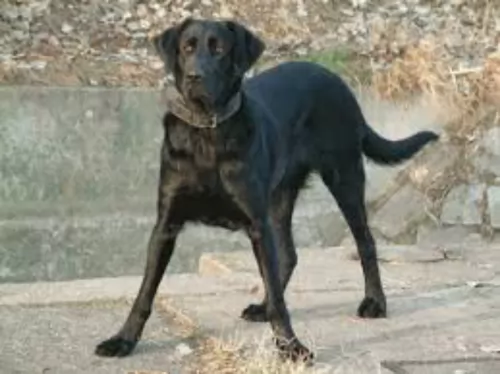 Cão de Castro Laboreiro originates from Portugal. Also known as the Portuguese Cattle Dog he was used long ago to guard livestock. Today, the modern Cao de Castro Laboreiro is descended from the molosser type dog.
Cão de Castro Laboreiro originates from Portugal. Also known as the Portuguese Cattle Dog he was used long ago to guard livestock. Today, the modern Cao de Castro Laboreiro is descended from the molosser type dog.
There are hints to the dog's origins from the 19th century, but changes in agricultural methods meant a disappearance of the dog as a livestock protector. Today the dog is mostly kept as a pet and was first seen at a dog show in 1914.
The Cão de Castro Laboreiro is recognized by the Fédération Cynologique Internationale as well as being recognized by the United Kennel Club in the United States.It is a rare dog and not many exist today but in Portugal, the USA and United Kingdom you will find a few breeders.
 The Scottish Terrier is also known as the Aberdeen Terrier but people who love and know him refer to him fondly as the Scottie.
The Scottish Terrier is also known as the Aberdeen Terrier but people who love and know him refer to him fondly as the Scottie.
These little dogs were originally bred to hunt vermin on farms and their actual origin is ancient. It is believed that the first descriptions of these dogs date way back to 1436 with there being 2 varieties - a rough-haired Scotch Terrier and a smooth-haired English Terrier.
In 1881 the Scottish Terrier Club of England was founded with the Scottish Terrier Club of Scotland being founded in 1888. Scotties were introduced to America in the early 1890s.
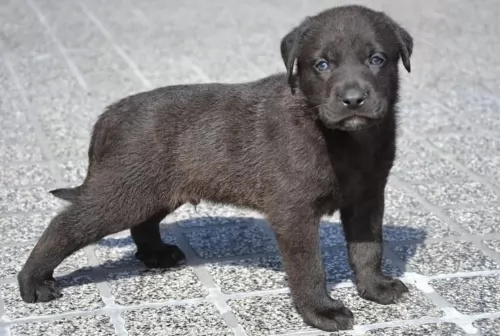 The Cão de Castro Laboreiro is a large dog, with height being in the region of 55 to 60cm and weight being in the region of 45 - 70kg. People describe the dog as wolf-like with a coat that is fairly short, thick and course. The coat is brindle with a base color of shades of grey, chestnut and black.
The Cão de Castro Laboreiro is a large dog, with height being in the region of 55 to 60cm and weight being in the region of 45 - 70kg. People describe the dog as wolf-like with a coat that is fairly short, thick and course. The coat is brindle with a base color of shades of grey, chestnut and black.
This large mastiff-type dog always has a black nose, his tail is long and carried high, but never curling over the back. He has a broad head and is much like the Labrador in looks, being free of wrinkles on the face.The ears of the Cao de Castro Laboreiro are medium-in-size and floppy while the eyes are dark brown.
The Cao de Castro Laboreiro makes an excellent pet as he forms strong bonds with his human family. He is territorial and makes an exceptional guard dog. He doesn’t particularly like strangers and is aloof around them.
This is an intelligent dog breed, he is strong-willed and stubborn, but when he is around the children in the family he is gentle and loving. When he has been trained and socialized, which is always highly recommended with every dog, he gets along with other pets in the home too.
 The Scottish Terrier is a small dog, fairly robustly built but with short legs. He has a wiry, weather-resistant coat and a soft undercoat. The coat is essentially black but there are other colors too such as a wheaten shade, grey-black and brindle too.
The Scottish Terrier is a small dog, fairly robustly built but with short legs. He has a wiry, weather-resistant coat and a soft undercoat. The coat is essentially black but there are other colors too such as a wheaten shade, grey-black and brindle too.
The ears are erect, the eyes small and bright. The tail isn’t docked but is of medium length and is nearly always held up, without curling over the back.
Height at withers for both males and females should be roughly 23 to 26cm and weight in the region of 8 – 10 kg.
The Scottie is a an independent, robust breed. He is playful as a puppy, but as he matures he becomes more dignified and dour. He is stubborn, but being a terrier he is alert and makes a good watchdog. For a small dog he has a powerful bark.
Brave, loving and loyal, he can fit into life in the city or the countryside so long has he has his human family close by. He doesn’t take kindly to strangers and he he slightly aggressive with other dogs he doesn’t know. He makes a great playmate for children but he certainly doesn’t like being prodded, sat on and poked by small children.
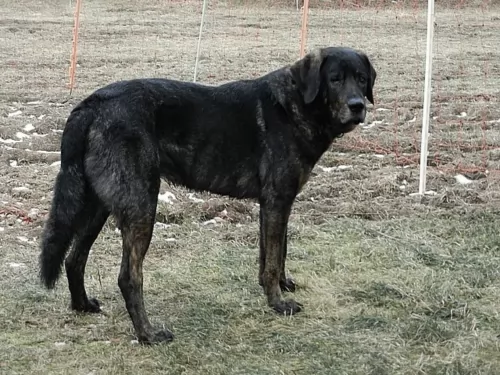 Environment and upbringing have plenty to do with how a dog turns out. People who just buy a dog for guardian purposes and nothing else can’t expect companionship in return.
Environment and upbringing have plenty to do with how a dog turns out. People who just buy a dog for guardian purposes and nothing else can’t expect companionship in return.
The Cão de Castro Laboreiro has always been a fearless guardian of livestock with his strong protective characteristics. He is intelligent and recognizes that a child in the family needs his protection.
This is a large dog who is strong, brave and intelligent but with his human family he is gentle, loving and loyal. Nonetheless he still requires a firm owner, and if you’re fair and firm with him you get the best with him. With this dog you can form a close friendship and bond.
 The Scottie is strong willed and independent, and training and socialization is important if you don’t want your Scottie believing he has the final say.
The Scottie is strong willed and independent, and training and socialization is important if you don’t want your Scottie believing he has the final say.
These dogs are stubborn and dominant and will need a strong, firm but kind owner. They’re aggressive with other dogs, but get on well with their human family.
When you bring one of these distinctive looking dogs into your home, he’ll be a loving, loyal friend.
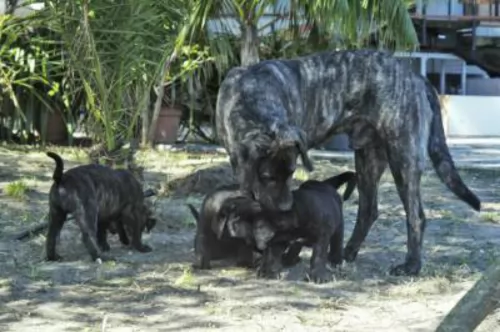 The Cão de Castro Laboreiro is generally a healthy breed, but even so, it is good to be aware of typical canine diseases that your pet may develop.
The Cão de Castro Laboreiro is generally a healthy breed, but even so, it is good to be aware of typical canine diseases that your pet may develop.
There are many eye problems that dogs have to contend with and if you see any kind of ulceration in your dogs eye, get veterinary advice.
A dog should always have access to a shady spot. Never ever leave your dog in a hot car. Heat builds up quickly and death can result soon as the body temperature rises.
Roundworm and tapeworm can infest dogs and you’ll need to speak to your vet about a worming program. Lice, mites and ticks are all parasites which attach themselves to the skin.
 Your Scottie is looked upon as being a generally healthy dog breed, but as with any other healthy dogs, he can succumb to some of the conditions and diseases that dogs get -
Your Scottie is looked upon as being a generally healthy dog breed, but as with any other healthy dogs, he can succumb to some of the conditions and diseases that dogs get -
This is an inherited blood disorder where the blood doesn’t clot properly. The dog will bleed excessively after an injury. Fortunately, while there isn’t a cure, dogs can lead normal lives.
Scottish Terriers are more prone to developing cancer than other dogs. Bladder cancer, lymphosarcoma and malignant melanoma are just some of the cancers they can get. Some cancers are treatable and there is a good success rate in dogs receiving chemotherapy.
When you brush your Scottie, look out for new, unusual lumps that could be indicative of cancer.
Scotty Cramp isn’t serious but uncomfortable for your pet. When your dog becomes worked up, you’ll see him arching his spine and he walks around for a few minutes with a stiff unnatural gait.
Obesity is regarded as a serious disease as it puts strain on the dogs joints and also creates back pain and digestive disorders.
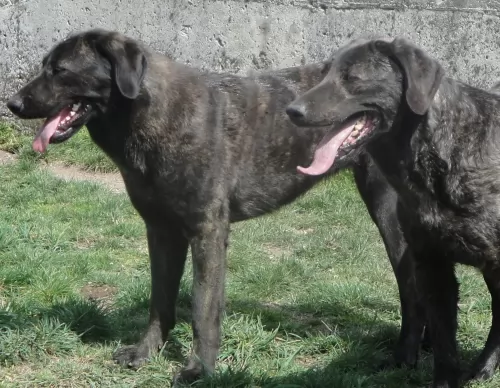 The Cao de Castro Laboreiro has a short coat which requires minimal grooming. Brushing him twice a week to rid him of loose hairs will suffice.
The Cao de Castro Laboreiro has a short coat which requires minimal grooming. Brushing him twice a week to rid him of loose hairs will suffice.
Nail clipping as well as ear- and teeth cleaning are other routine maintenance procedures for your pet.
The food you give your pet must be well-balanced and have protein and carbohydrates. If you want his skin and hair to remain healthy, vitamins, fatty acids and minerals will also be needed.
Boneless chicken and fish, brown rice and vegetables can be a good choice as well as some of the top quality commercially manufactured foods. An active dog will always need a higher protein content and therefore including raw meat into the diet is imperative – not every day as it can be very expensive, but every other day.
Remember that bones can be dangerous as they can splinter and cause your pet internal damage. Fresh, cool water must be available at all times.
 Scotties were once bred as working dogs, and they will certainly require daily exercise and stimulation. He will love a walk but you can’t expect him to run with you as he has short legs.
Scotties were once bred as working dogs, and they will certainly require daily exercise and stimulation. He will love a walk but you can’t expect him to run with you as he has short legs.
The Scottie sheds, so he will need to be brushed at least twice weekly. He will require quite a bit of grooming in terms of having the coat professionally trimmed and clipped.
His eyes and ears will need to be checked as well as his teeth. He can’t tell you if he has terrible toothache and while brushing him, check the teeth. Trim his nails too.
It is always recommended that you feed dogs according to size, age and activity levels. Dogs are individuals and they don’t all need the same food.
The quality of the dog food you provide makes a huge difference on your dog’s health. It always pays to go with the better quality kibble available to dogs. Your Scottish Terrier will be depending on your for quality kibble with the right blend of vitamins and minerals.
Dogs thrive on simplicity and consistency and you want to provide him with some home-made food too that gels well with his digestive system. A little bit of raw meat occasionally can also do him the world of good.
Make sure he always has cool, fresh water to drink.